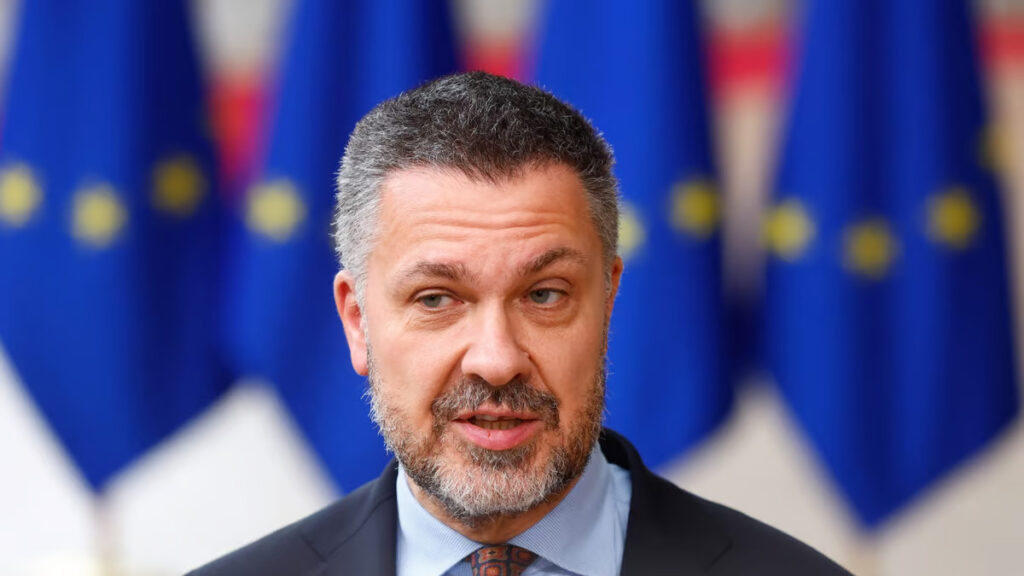Suspected of corruption in the Qatargate case, Luca Visentini is no longer general secretary of the International Trade Union Confederation, an organization which represents more than 200 million workers throughout the world. The decision was taken on March 11 following an independent internal audit, a document of about fifteen pages of which we have read.
This dismissal follows the alleged involvement of Luca Visentini in a vast corruption scandal on the part of Qatar and Morocco. Objective: to influence decisions in their favor in the European Parliament and in several international trade union bodies.
Luca Visentini recognized it himself. He did receive money from Fight Impunity, the human rights association created by Pier Antonio Panzeri, the alleged mastermind of Qatargate. A donation of 43,000 euros, received in cash, in denominations of 50 euros.
This money, Luca Visentini used it to finance the electoral campaign which propelled him to the head of the International Trade Union Confederation. It was last November, during a congress in Melbourne, Australia. Part of the sum having served to pay for the travel of certain national delegations which otherwise would not have been able to vote.
Lightness and recklessness, but no proven corruption
“The recent accusations against the newly elected General Secretary Luca Visentini have seriously damaged the reputation of the ITUC and more generally of the whole movement for the defense of workers throughout the world” begins the audit . “Corruption, even the slightest suspicion, is extremely serious, and erodes the elementary confidence in our structure” .
Regarding the Visenti case, the audit concluded that by accepting this money from Fight Impunity, he would have lacked judgment, and that he undoubtedly put his personal interests before those of the organization. No evidence of corruption so far, but inappropriate decisions that resulted in a breach of trust between the Italian and the International Trade Union Confederation.
Olivier De Schutter is a professor of international law at UCLouvain. He participated as an external expert in the drafting of this audit. And for him it is very clear, Luca Visentini at the very least lacked caution when he accepted 43,000 euros in cash: “We must ask the question of why the payment is made in cash and why there is no no more transparency in the way in which these funds were collected. So the impression, if you like, which emerges from the analysis of the facts, is that Mr Visentini didn’t want to ask too many questions. It seems to me that he acted lightly, that he was insufficiently prudent. He wanted to seize the opportunity to see his campaign financed by this donation from Mr. Panzeri. But nothing leads me to think that his position on Qatar was influenced by that. And I don’t think, therefore, that he was corrupted.”
Arrested on December 9, Luca Visentini was then released on conditions. In a statement following his dismissal on March 11, the Italian trade unionist claimed to have acted in good faith, rejecting allegations of corruption and money laundering. He also declared that in no case was the ITUC involved in the investigation opened by the Belgian courts.

The Deputy Secretary General in the hot seat
In its audit, the special commission also states that it has found no information on possible corruption of the ITUC. This is despite the fact that in recent years the ITUC has been less and less critical of the abuses committed in Qatar against the migrant workers who built the stadiums and infrastructure for the FIFA World Cup.“No element collected by the special commission suggests that Qatar or Morocco would have influenced the positions of the CSI on the merits” confirms Olivier De Schutter. “His positions have certainly evolved over time, but they have evolved with the discussions that have taken place between the ILO, the international labor organization, and Qatar, in particular concerning the prohibition of the kafala system which binds migrant workers to their employers. And the ILO has accompanied labor law reforms in Qatar, which has led the ITUC to tone down its criticisms. But there is nothing to suggest that the ITUC’s positions have been influenced by this Fight Impunity donation”.
Nevertheless, the authors of the audit call on the ITUC to reform itself urgently. Because, in the face of corruption, the organization is presented as “vulnerable”. As the audit states, it “lacks the necessary modern rules and procedures to ensure that no outside influence can contaminate the organization.” The flaws are operational, financial, constitutional and political. The urgency relates in particular to the necessary transparency concerning the funds received in cash by the ITUC.
“It’s more than a mistake, it’s a fault”
The example of Lucas Visentini is eloquent. Last November, when he was running for the head of the ITUC, the Italian trade unionist donated a large sum of money to the organisation. “The CSI received €23,000 in cash from Mr. Visentini and then delayed recording this voluntary contribution in its accounts”. explains Olivier De Schutter.
And indeed: While the CSI received this money on November 7, it was not until December 9 that this Fight Impunity donation formally appeared in the Confederation’s accounts. Damning detail: this document has been backdated. Something to startle Thierry Bodson, the president of the FGTB, himself a member of the CSI. “When, in an audit report, we speak of a backdated document and especially of a backdated accounting document, it is more than an error, it is a fault”! .
And for Thierry Bodson it is very clear, the fault comes from the current Deputy Secretary General, the Briton Owen Tudor. The audit accuses him of serious shortcomings in the management of this donation. This is why, in the future, he will no longer be able to approve the Confederation’s financial documents alone and will not steer the future reforms to be undertaken either.
A fragile institution that urgently needs strengthening
More generally, the audit insists on the need for better financial management and on the establishment of rules, which do not exist today, with regard to the financing of campaigns for the election of the General Secretary of the ITUC.
And on this subject, Olivier De Schutter puts forward his little idea: “The ideal would obviously be that all the candidates for the mandate of Secretary General, or another elective mandate within the ITUC, receive an identical amount for all to conduct a campaign, provided that the candidate garners a sufficient number of supporters, declarations of support throughout the international trade union movement.In the same way that political parties in well-functioning democracies benefit from public funding to prevent money from having too great an influence in politics, the ITUC should adopt a similar mechanism”.
Next deadline, June 10 with the appointment of an interim secretary general. It is up to him to organize a new CSI congress by the end of the year and to elect a new team capable of turning the page on Qatargate by guaranteeing the total independence of the structure.
Source: RTBF


